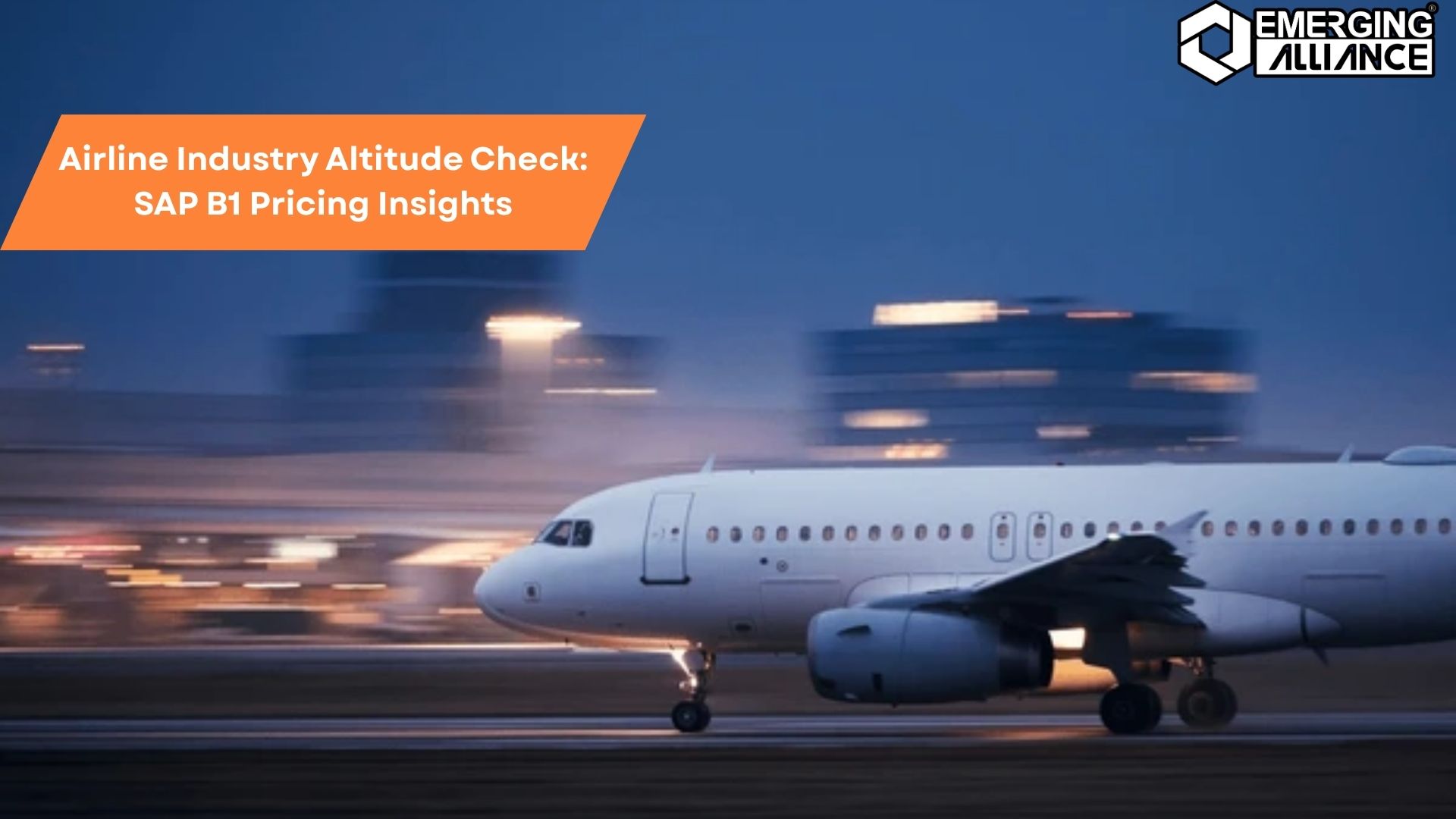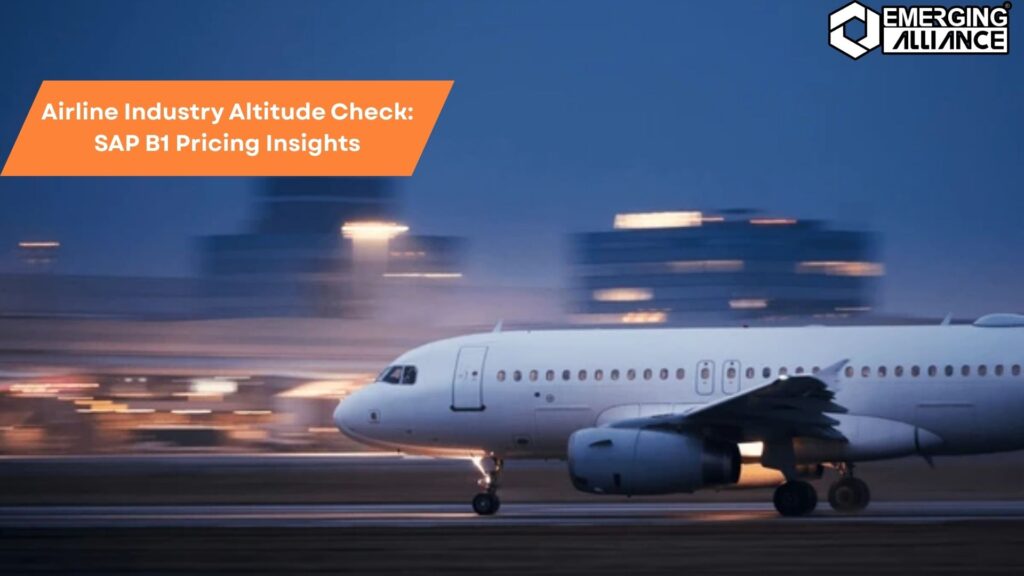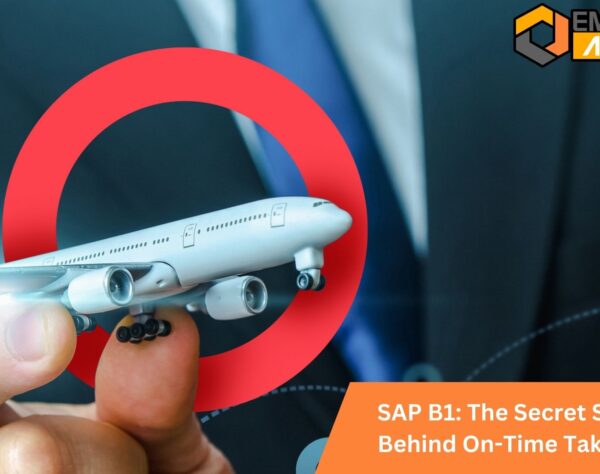
Airline Industry Altitude Check: SAP B1 Pricing Insights

SAP B1 Pricing Strategies for Airline Industry: Unlocking Operational Altitude
In an industry where fuel prices fluctuate, regulations tighten, and customer expectations evolve daily, the airline sector constantly seeks smarter, scalable, and cost-effective solutions. SAP B1 for Airline Industry emerges as a game-changer, offering integrated tools to manage operations, reduce inefficiencies, and streamline decision-making. But the key question many decision-makers ask is: what’s the real value of SAP B1 Pricing in this context?
This blog explores how SAP Business One for Airline Industry offers critical ROI, why choosing the right SAP Implementation Partner matters, and what makes a trusted SAP Partner essential in the journey.
Why SAP Business One is Tailored for Airline Industry
Airlines operate in a complex matrix of logistics, regulatory compliance, scheduling, crew management, and customer experience. Traditional software often fails to unify these components. Enter SAP Business One, an ERP solution designed for growing enterprises with industry-specific needs.
SAP Business One for Airline Industry centralizes operations—linking procurement, finance, maintenance schedules, ticketing systems, and HR workflows. This consolidation not only simplifies management but also allows real-time data visibility across departments.
With SAP B1, airline companies can:
- Automate maintenance tracking and reduce aircraft downtime.
- Improve parts inventory management.
- Integrate real-time flight operations with finance and human resources.
- Generate reports for performance, audits, and forecasting instantly.
The true magic lies in aligning these features with optimized SAP B1 Pricing strategies tailored to the unique needs of each airline.
What Drives SAP B1 Pricing in Airline Industry?
SAP B1 Pricing isn’t one-size-fits-all. It factors in the scale of operations, number of users, custom modules, and cloud versus on-premise deployment. For airlines, this flexibility is a significant advantage.
Factors influencing pricing include:
- Number of aircraft and flight routes managed
- Integration requirements with booking and scheduling platforms
- Compliance and audit module needs
- Custom dashboards for crew and fleet management
Working with a certified SAP Partner helps airline companies choose the optimal modules while avoiding unnecessary expenditures.
Additionally, a reliable SAP Implementation Partner ensures smooth rollout, quick employee onboarding, and minimal downtime, further influencing long-term ROI and total cost of ownership.
Key Benefits of SAP B1 for Airline Industry Operations
Let’s break down the real-world benefits of deploying SAP Business One for Airline Industry:
1. Fleet Maintenance & Parts Inventory
Managing parts, tools, and routine checks is challenging without a unified system. SAP Business One offers maintenance logs, warranty tracking, and automatic part reordering—reducing grounded time.
2. Financial Visibility & Cost Control
SAP B1 Pricing offers access to robust budgeting and forecasting tools. Airlines can monitor fuel costs, operational expenses, and route profitability with granular visibility.
3. Real-Time Operations Integration
Flight delays, gate changes, and crew reassignments can be managed in real time using SAP B1 for Airline Industry, avoiding costly disruptions.
4. HR and Compliance Management
From pilot training schedules to crew certification tracking, SAP Business One integrates HR with compliance, ensuring your airline meets industry standards without extra systems.
5. Scalable Architecture
Whether you’re a regional carrier or scaling internationally, SAP B1 Pricing grows with your operations. You can start small and scale modules as needed.
Why an SAP Implementation Partner is Critical
An SAP Implementation Partner isn’t just a vendor—they are your strategic ally. For airline businesses, this partnership ensures:
- Customized deployment based on fleet size and operational complexity
- Seamless data migration from legacy systems
- Staff training for effective system adoption
- Ongoing support and updates from an experienced SAP Partner
Choosing the right SAP Partner can dramatically reduce post-implementation headaches and ensure the solution is aligned with the airline’s long-term strategy.
SAP B1 Pricing: Transparency and Value
Airlines often worry about hidden costs in ERP systems. With SAP B1 Pricing, you get transparent, modular costs, allowing you to invest in what matters. Licensing models range from starter packages to enterprise options.
Many SAP Partners offer bundled services, training, and maintenance under flexible terms. Additionally, cloud hosting further reduces infrastructure costs, making SAP Business One even more appealing for modern airline businesses.
The Bottom Line: Is SAP B1 for Airline Industry Worth It?
Absolutely. When implemented with a trusted SAP Partner, SAP Business One for Airline Industry offers substantial long-term gains. Improved operational efficiency, reduced downtime, better financial visibility, and enhanced compliance control all translate to a stronger bottom line.
And with tailored SAP B1 Pricing, airlines can scale confidently without overspending.
Final Thoughts
The skies are getting more competitive, but with the right ERP solution and implementation strategy, airline companies can soar above the turbulence. SAP Business One is not just a software solution—it’s an operational transformation engine.
The choice of the right SAP Implementation Partner and SAP Partner will determine how smoothly you ascend and how efficiently you stay airborne.
FAQs: Airline Industry and SAP B1
Q1: How does SAP B1 help manage airline compliance audits?
SAP B1 provides built-in compliance tools that track certifications, audits, and regulatory timelines across departments.
Q2: Can SAP Business One integrate with airline ticketing systems?
Yes, SAP B1 can be integrated with most major booking and ticketing platforms through APIs.
Q3: What role does SAP B1 play in fleet maintenance planning?
SAP B1 automates maintenance schedules, logs repair histories, and tracks inventory for parts.
Q4: Is SAP B1 suitable for small or regional airlines?
Yes, the modular design and scalable SAP B1 Pricing make it ideal for regional carriers.
Q5: Can SAP B1 monitor flight route profitability?
Absolutely. SAP B1 enables granular cost tracking and profitability analysis per route.
Q6: Does SAP B1 support mobile access for airline managers on the go?
Yes, mobile apps and cloud access make SAP B1 accessible from anywhere.
Q7: How does SAP B1 handle crew scheduling?
Crew assignments, certifications, and shift planning are managed in a centralized dashboard.
Q8: Can SAP B1 support international airline operations?
Yes, SAP B1 supports multi-currency, multi-language, and multi-location setups.
Q9: How secure is SAP B1 for airline data?
SAP B1 uses advanced encryption and role-based access controls to secure sensitive airline data.
Q10: What makes a great SAP Implementation Partner for airlines?
Industry experience, certified SAP expertise, post-implementation support, and customization capabilities.




